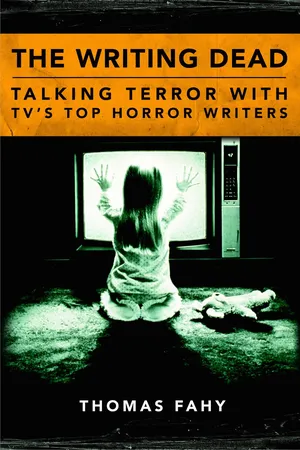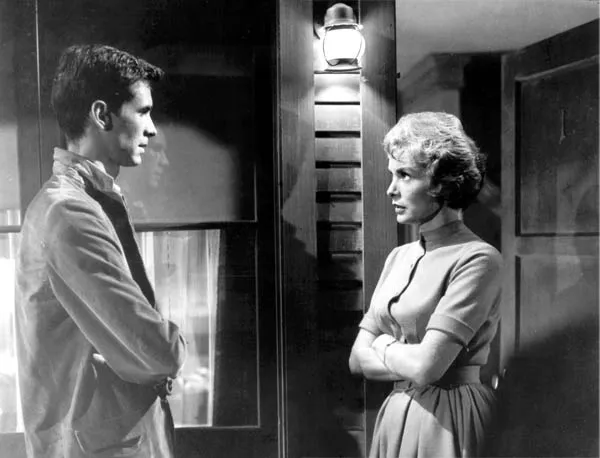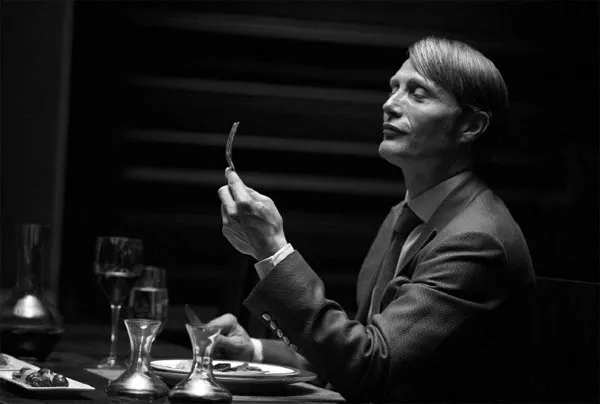![]()
Norman Bates (Anthony Perkins) and Marion Crane (Janet Leigh) in Psycho (1960). Directed by Alfred Hitchcock. Paramount Pictures/Photofest, © Paramount Pictures.
Part I
BLAME IT ON MOM
Even Serial Killers Need a Hug
![]()
Hannibal
AN INTERVIEW WITH BRYAN FULLER
Bryan Fuller may not be a culinary wiz when compared to Hannibal Lecter, but his newest show, Hannibal, is serving up some horrific dishes for horror fans. Fuller considers all of his work for television—as the creator and writer of the critically acclaimed shows Dead Like Me, Wonderfalls, and Pushing Daisies—to be inspired by horror. His television career started on Star Trek: Deep Space Nine and Star Trek: Voyager, and he also served as a writer and producer on the series Heroes.
Fahy: You seem to be having an awful lot of fun with food on Hannibal, so there is one question I’m dying to ask. Do you yourself cook and has Hannibal used any of your recipes?
Fuller: (laughs) I cook, but I usually use somebody else’s recipes. The recipes that Hannibal uses are from Chef José Andrés who is a James Beard award-winning chef. He has been on Top Chef, has had his own show in Spain, and is a world-renowned culinary expert. I knew that Hannibal Lecter had to have a vastly superior culinary knowledge than I do, so I reached out to José Andrés. He was very enthusiastic about being the consultant on the show. He is a very interesting guy. Our first meeting happened when he had just won the James Beard Award, and I approached him at the reception: “Hi, I’m so-and-so, and I’m working on this Hannibal project.” His eyes just lit up. He said, “You have to let me be the consultant for the food.” And I told him, “That’s actually why I’m talking to you because I want you to be.”
He never got precious about the cannibalism. He always approached the dishes as meat is meat is meat. Therefore, if you’re eating meat, you have to accept that human beings are meat, and that is a valid form of protein if there is no other one available.
There was an article that came out recently about what happened to the Missing Link between Homo sapiens and Neanderthals. What they determined was that Homo sapiens ate the Missing Link, which is why we can’t find them.
Fahy: You are a long-time horror fan, and this show is not the first time you’ve worked with this horror in television and film. Had you been interested in working with the character of Hannibal Lecter for some time? And how did the show come about?
Fuller: Actually, it kind of fell into my lap in a very interesting way. I was on a plane ride sitting behind a friend of mine who had just become the CEO of Gaumont Television. She told me they had just acquired the rights to the Hannibal Lecter character, and she asked if I thought there was a show there.
My first response was, “Oh my God, I have to do this to make sure it is something I would want to watch.” There are so many ways of telling a Hannibal Lecter story. I just wanted to make sure the version that we saw on the television show was one that I wanted to sit down in front of. So my motivation to work on the show was very selfish.
Fahy: Is there something particular about Lecter’s character that made you want to get into his head, which, I would imagine, is a pretty scary place to spend time? Were you at all nervous about writing such an iconic villain?
Fuller: Well, it was actually scarier to get inside Will Graham’s head because he is the one who is damaged by exploring these ideas. So you really have to get into the psychological head space of somebody who is not willing to be there. It’s harmful to him to hunt these killers. Whereas Hannibal is kind of getting a kick out of what he does. It is actually less traumatic to write for him in a way than for Will Graham. Lecter knows who he is. He has a confidence in his villainy that he is doing the right thing. My approach to writing him has always been to present him as the sanest person in the room. There is something very exciting about writing a villain who is so hyper-sane and protective of society and humanity in such an unorthodox fashion that he is willing to kill and eat people to protect the beauty of society as he sees it. There is a kind of fun quality to his attitude of eat the rude. (In the books, he refers to his victims as “free-range rudes.”)
Hannibal Lecter (Mads Mikkelsen) sits down to enjoy a good meal on Hannibal (NBC). “Aperitif” (Season 1, Episode 1). NBC/Photofest, © NBC.
I really wasn’t nervous about approaching Lecter’s character in one sense because I had a clear idea of who he was and what chapter of his life was interesting to tell. My intention was to be very faithful to how he is portrayed in the literature, so I felt a confidence in my approach. As long as I stick close to the version that Thomas Harris wrote and did a lot of the heavy lifting in fleshing out, I’m going to be relatively safe. As a hardcore fan, I feel like I just have to stay true to myself as an audience member because a) I’m very protective of the character, and b) very enthusiastic about the character. So I’m kind of the right fan boy to do the job in an interesting way.
Fahy: Even with all of your experience, I would imagine that seeing actors bring alive your writing must still be a thrill. Have there been any performances by the actors in Hannibal that surprised you, that made you develop a character differently than you had expected?
Fuller: All of them have been pretty surprising. I think Hugh Dancy has interpreted his character in such a delicate way that arguably could be alienating in another actor’s hands, but he has made it very seductive in a fashion that the audience and myself feel protective of Will Graham—because he is so unhappy, because he is such a sweet puppy-soul of a man. (laughs)
We are horrified by the hoops that Hannibal has him jumping through, but we are also rooting for his purity and humanity. As Jack Crawford says, Will Graham is such a pure individual that he will always come back to being himself. In a sense, Jack Crawford has got a better understanding of Will Graham than Hannibal Lecter in that he understands Will as a pure being. Hannibal is betting that Will Graham is not so pure if he can imagine these things, and Will Graham is terrified of his imagination. In Red Dragon, Will Graham views his imagination as a chair made of antlers, which is grotesque but functional. I thought that was a really interesting idea to run with. Will has a very centered self, but it is being thrown into this calamitous storm of Hannibal Lecter’s machinations. So we worry if he is going to take on too much water and sink. That is the journey of the first season.
The exciting thing about the second season is that Will Graham hits rock bottom, and the thing that I’m very eager to write and to see is how he comes out swinging. He is such a victim in the first season, but in the second season, we are going to see a change in how he deals with Hannibal Lecter. Will is going to be as sly and manipulative as Hannibal was with him in the first season.
Fahy: Does that set the stage for moving the series more closely to the point where the story intersects with Red Dragon?
Fuller: Yes. I would argue that Will Graham was so psychologically traumatized by investigating the serial killer the “Minnesota Shrike” that he had to be institutionalized. I feel like we are well within the cannon of the literature, and it is about finding a way to come out of that darkness—to get Will Graham to a place in season four (our “Red Dragon” season) where he would be closely aligned with whom Will Graham was in the book. So I have two chapters to put Will through the ringer and to get him back.
Fahy: The show is particularly gruesome at times, which is certainly in line with the novels and the character of Hannibal Lecter. Is there a line you won’t cross in this show?
Fuller: Well, I’m not interested in rape stories particularly. For me, most of the serial killers are about rape, murder, and control. As Will Graham says in the first episode, it’s about a male penetrative control issue. The ripped from the headlines, true-crime nature of a lot of television procedurals doesn’t have an appeal for me because I’m actually very, very sensitive—despite being such a huge horror movie fan. (laughs)
So I’m not a fan of horror movies where everybody dies. That is too nihilistic for me. But the horror we do on Hannibal is much more philosophical, psychological, artistic horror. Every one of our killers has some sort of philosophy behind their approach to murder that is honoring what Thomas Harris established with his villains. Take, for instance, the Red Dragon himself, a man in his mid-forties who is experiencing a midlife crisis of sorts and who feels a need to evolve into a super being that will be infinite. This desire is wrapped in certain childhood traumas. Or take Buffalo Bill who wants to be a woman so badly that he is making a woman suit out of real women. There is always this kind of kink to the murderers, and we really try to embrace that and reflect that as much as we can in the characters on the show. So we have a character like Elden Stammetz (“Amuse-Bouche”), who is a man looking for a connection because he understands the way mycelium reflects a lot of properties of the physical human being, yet this substance is better at connecting. That parallels Will Graham’s feeling a pull to connect with Hannibal Lecter. Or we have Tobias Budge who is a serial killer who wants to recreate an authentic, dark sound that doesn’t exist with modern musical instruments. He is literally taking his strings from human guts and teaching children how to play them so they have this larger-than-life, epic quality to them. That was also an interesting episode about whether or not serial killers can have friends (“Fromage”). We got to explore that in a way.
Every one of these killers has an interesting point of view on murder. For me, given my sensitivity, that approach places the serial killer above reality, so they are the work of fiction and art as opposed to something that is real that I don’t want in my head. I don’t want to think about horrible people who do terrible things to humanity just because they’re assholes. And most of the time with serial killers that is the case. They are just assholes. What we are painting on the show are works of fiction. Hannibal Lecter himself is a work of fiction. As Thomas Harris says in Red Dragon, he is uncategorizable as a crazy person. He is not a psychopath because he experiences regret. He is not a sociopath because he experiences empathy. So what exactly is he? The most interesting answer I’ve heard so far comes from Mads Mikkelsen who says he is the Devil.
Fahy: Even though there is an artistic or aesthetic quality to the killers in Hannibal, I’m curious if your own work ever scares you when you see it come alive on screen? What is your reaction to seeing the finished product?
Fuller: It depends on when I see an episode. If I watch an episode right before going to sleep, it will give me nightmares. (laughs)
The episode where Will Graham is projecting the crime of Abel Gideon (“Entrée”) in the institution where he viciously murdered the night nurse is so disturbing and violent. I loved Hugh Dancy’s performance. When he comes out of that projection, he is on the verge of tears, rattled, and very emotional because it was such a terrible thing for him to imagine. After I watched it, I went to bed and had nightmares all night long.
Fahy: You’ve been talking about your passion for horror, but in many respects, the tone and subject matter of Hannibal is quite different from some of your previous shows, Dead Like Me, Pushing Daisies, and Wonderfalls. Has that been a difficult shift? Or do you see connections between these works?
Fuller: I absolutely see connections between them. I would argue that Dead Like Me and Pushing Daisies are horror stories, just told with levity and comedy and romance. Essentially, Pushing Daisies is a zombie story. All of the tension and thrills of horror are removed and replaced with romantic comedy, but a lot of the tropes are there with violent deaths and people coming back to life and horrible mutilations of the body. I see it as romantic comedy horror. And Dead Like Me is about a girl who becomes a Grim Reaper and starts taking lives as these creatures, Gravelings, are arranging horrific accidents for people who need to die at a given time to keep the balance of life. I see those as horror adjacent.
Wonderfalls is really about a woman who is losing her mind. Jaye from Wonderfalls has a lot of similarities with Will Graham in Hannibal. Will is a man who is losing his mind. We just told that loss of sanity with Jaye through comedy and romance to make it a little more palpable, but if you strip comedy and romance away, you would get a similar journey that Hugh Dancy’s Will Graham is going through.
I feel like I put in a little horror in everything I do, but I just candy-coated it beyond immediate recognition in those early shows. Now with Hannibal, it is about the savory dessert as opposed to the sweet one. There are certain delicious, desserty qualities to the show for me creatively because I get to tell these wild, fantastic murders, but I ground them in a way that makes them a little more psychologically penetrative.
I feel l...


